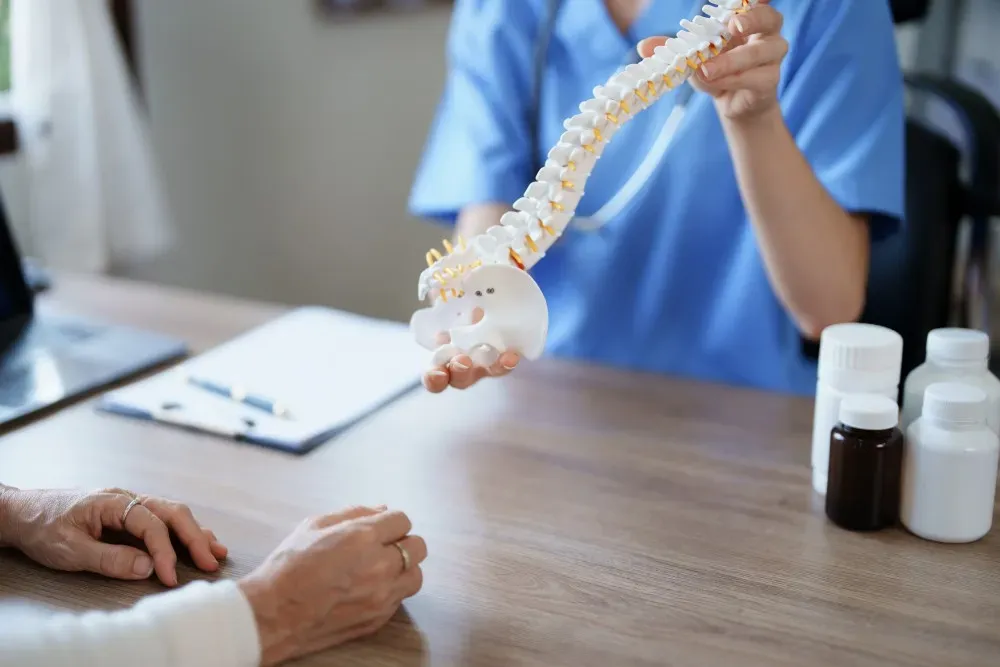Neurosurgery & Orthopedic Surgeons in Jacksonville

When Should I See an Orthopedic Specialist?
An orthopedic specialist diagnoses and treats musculoskeletal conditions and injuries. The musculoskeletal system includes your bones, joints, ligaments, tendons, muscles and nerves.
WHEN SHOULD I SEE AN ORTHOPEDIC SPECIALIST?
An orthopedic specialist diagnoses and treats musculoskeletal conditions and injuries. The musculoskeletal system includes your bones, joints, ligaments, tendons, muscles and nerves. At Integrity Spine and Orthopedics, our board-certified orthopedic surgeons are trained to manage everything from an acute ankle sprain following a sports accident to chronic arthritis pain and joint damage. If you’re living with pain and decreased movement, keep reading to learn more about when it’s time to call a specialist and what to expect from your orthopedist.
6 SIGNS IT’S TIME TO SEE AN ORTHOPEDIC DOCTOR
If you’re experiencing one of more of the following, please call Integrity Spine and Orthopedics today.
- You have difficulty performing daily activities. All too often, people put off going to the doctor because they believe aches and pains are a normal part of aging. And while that may be true for some minor aches, if you’re experiencing muscle, joint, back or neck pain, stiffness, and weakness that prevents you from functioning, that isn’t normal. It’s time to see an orthopedic specialist if you’re having trouble running errands, walking the dog, getting dressed, climbing stairs or getting into and out of the car.
- You’ve been living with chronic pain for several months. It’s normal to feel some pain and discomfort for a few days after suffering an injury or sleeping with your neck in an abnormal position. However, if you’ve been living with back, neck or joint pain for more than three months, it’s time to see an orthopedist for an evaluation. Bone or joint pain could be the first sign of a more serious condition like arthritis, especially if it’s accompanied by morning stiffness, swelling and tenderness.
- You have difficulty walking. One telltale sign of a joint condition is feeling unstable or shaky while walking, standing or transitioning from sit to stand. Feeling wobbly or unstable on your feet can be very dangerous and increase your risk for falls and injuries. Make an appointment to see a doctor as soon as possible if you’re experiencing unsteadiness.
- You have decreased range of motion. An early sign of arthritis is joint stiffness and loss of joint range of motion. If you find that you can’t fully bend and straighten a knee, or that you can’t bend or twist your spine like you once could, it’s time to get checked out by an orthopedist.
- You have numbness or tingling in your extremities. Weakness, numbness or tingling that radiates down an arm, leg, hand or foot could be a sign of nerve compression. Nerve compression can occur from repetitive movements that inflame soft tissues, causing them to press against nearby nerves, or age-related spine degeneration from a herniated disc or spinal stenosis. Left untreated, nerve compression can cause significant pain, weakness and loss of mobility. See your doctor for numbness or tingling that lasts longer than a few days.
- You have an injury that isn’t healing. Sports injuries, falls, car accidents, job-related accidents — these can all cause soft tissue damage, tears and inflammation. If you sustained a sprain or strain that hasn’t improved after 48 hours, it’s time to get yourself to a doctor. Without proper orthopedic care and treatment, acute soft tissue injuries have the potential to become a source of chronic pain.
WHAT TO EXPECT WITH ORTHOPEDIC CARE
After you’ve decided to make an appointment with an orthopedic specialist, you may be wondering what to expect during your appointment and afterward. In order to accurately diagnose and treat your condition, your orthopedic doctor will perform the following:
- Take a medical history. At your first visit, your orthopedist will want to know your full medical history, including family history, previously diagnosed medical conditions, current medications and a history of injuries or accidents. Additionally, your doctor will want to know all about the pain and symptoms you’re experiencing, the severity, the location, things that worsen the pain and things that make the pain feel better. Your story is one of the most important components your doctor needs to make an accurate diagnosis. So be completely honest and give as much detail as possible.
- Perform a physical exam. Next, your orthopedist will perform a physical exam to identify painful areas and test your strength, flexibility and range of motion. During the exam, your doctor will tell you to describe any pain you’re feeling and its intensity.
- Order tests. Your doctor may order lab work, blood work, nerve studies or imaging exams to check for abnormalities and rule out some causes of pain before making a diagnosis.
- Make a treatment plan. Once your doctor makes a diagnosis, he or she will create a treatment plan to help heal any injuries, reduce your pain and improve your functional mobility. Your treatment plan might contain multiple treatments ranging from non-surgical interventions to orthopedic surgery. Medications, corticosteroid injections and nerve block injections can help you manage pain. Physical therapy, regular exercise and weight management can help you improve strength, flexibility and range of motion. Orthopedic surgery might be an option to repair a fracture or relieve pressure on compressed nerves.
- Provide monitoring and adjustments. Once you begin treatment, your orthopedist will monitor your progress and make adjustments to your plan as needed. Be patient — healing takes time and hard work, and you won’t bounce back all at once. But your orthopedist will be with you every step of the way to help get you back to doing what you love as soon as possible.
CONTACT INTEGRITY SPINE AND ORTHOPEDICS FOR BACK, NECK, SPINE AND JOINT PAIN
At Integrity Spine and Orthopedics, our board-certified orthopedic surgeons treat a wide range of back, neck, spine, joint and soft tissue injuries. Whether you’re suffering from acute whiplash after a car accident or chronic pain from a herniated spinal disc, we have the orthopedic care, pain management and surgery services to help you.
We have a clinic conveniently located in Jacksonville, FL. Please call us or reach out online to schedule your first appointment.




